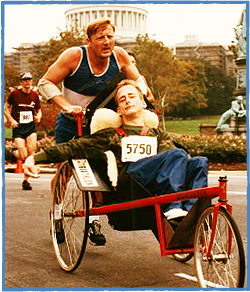
When Dick and Judy Hoyt became parents on January 10, 1962, it quickly became evident that something had gone terribly wrong.
The umbilical cord was wrapped around their son’s neck. Because of oxygen deprivation to his brain, little Rick had cerebral palsy. He would never be able to walk or talk.
Numerous physicians assured the Hoyts that their son was incapable of learning or comprehension. They encouraged institutionalizing him for the rest of his life.
Judy and Dick, however, noticed that even though Rick had little control over his muscles, his eyes followed them around the room. They clung to the hope that one day he might be able to communicate. When Rick was 11, they took him to the engineering department at Tufts University to see if someone could fashion a device to help make that happen.
University officials were dismissive. They saw no evidence that Rick’s brain was functioning normally. “Tell him a joke,” Dick said. When someone cracked a joke, Rick laughed.
The engineers at Tufts ultimately crafted a simple computer that allowed the speechless boy to type out sentences by moving his head (the only part of his body he could control) against a button. It was a laborious process. But suddenly, miraculously, Rick Hoyt – for the first time in his life – was in touch with the world around him.
From the start, it was evident he was bright. He began to attend public schools. In 1993, at the age of 31, he graduated from Boston University with a degree in special education. Rick would go on to work in a computer lab at Boston College developing communication systems for other men and women with disabilities.
But it was something that happened in 1977 that forever changed the Hoyt family.
Fifteen-year-old Rick heard about a high school lacrosse player who had been paralyzed in an accident. A five-mile run had been organized to defray his expenses. Rick typed out these words: “Dad, I want to run.”
Dick was now 36 years old and had, in his own estimation, seriously let himself go. He had never run over a mile in his life. He put Rick into a wheelchair and trotted behind him, puffing and wheezing, for five miles. After the event Rick wrote, “Dad, when I’m running, it feels like I’m not handicapped.”
Those words transformed Dick.
Father and son began to run together, Dick pushing a specially designed three-wheel chair. Over the years they completed 1,130 endurance events, including more than 200 triathlons. Team Hoyt ran the 26.2-mile distance of the marathon 72 times – the Boston Marathon on 32 occasions. Dick’s best time is within 30 minutes of the world record – which was not set, as Sports Illustrated columnist Rick Reilly observed, by a guy pushing his son in a wheelchair. In 1992, they biked and ran together 3,770 miles across the United States, all the way from the Pacific to the Atlantic.
There are numerous video montages of Rick and Dick available online. Some of them are half-hour documentaries. Here’s a shorter one that will give you a heartwarming glimpse into their story. Kleenex are highly recommended.
Dick is now 80 years old. Rick is 58. Their days of running together are probably over.
But they have left behind a lasting lesson about the nature of disability.
In his book Who is this Man? John Ortberg writes: “The Greeks loved physical excellence and perfection, the nobility of striving. They gave us the Olympics, through which mortals strove to be like the gods of Olympus. They gave us the marathon, the ultimate test of human will and strength. They did not give us the story of a marathon being run by a man carrying his crippled son.”
Yet that is the spirit of the New Testament.
Disabled little ones in the ancient world were usually cast aside. But Jesus makes it clear that showing compassion to “the least of these” is equivalent to honoring him. (Matthew 25:40) Loving the least and the last is how we love God.
Our ladder-climbing world suggests that a little child should grow up to be like King Herod. The Bible declares that the best thing King Herod could have done was to become like a little child.
Theologians call it the Great Reversal. The first shall be last, and the last shall be first.
And by the grace of God, lives that were thought not worth living become the most inspiring lives of all.
